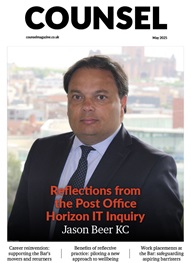*/


Please complete the Barristers’ Working Lives survey this month to help shape and prioritise the Bar Council’s work
Rachel Davenport, Co-founder and Director at AlphaBiolabs, discusses the company’s commitment to giving back to communities across the UK
By Kem Kemal of Henry Dannell
By Nick Bonnello and Aaron Young of RWB Chartered Accountants
By Kem Kemal of Henry Dannell
A comparison – Dan Monaghan, Head of DWF Chambers, invites two viewpoints
Animal sexual abuse is a distressing and taboo subject. Yet, write Christina Warner and Maya Badham, this hidden crisis, where legal, ethical and psychological factors converge, requires frank discussion
Maria Scotland and Niamh Wilkie report from the Bar Council’s 2024 visit to the United Arab Emirates exploring practice development opportunities for the England and Wales family Bar
Marking Neurodiversity Week 2025, an anonymous barrister shares the revelations and emotions from a mid-career diagnosis with a view to encouraging others to find out more
David Wurtzel analyses the outcome of the 2024 silk competition and how it compares with previous years, revealing some striking trends and home truths for the profession
Save for some high-flyers and those who can become commercial arbitrators, it is generally a question of all or nothing but that does not mean moving from hero to zero, says Andrew Hillier